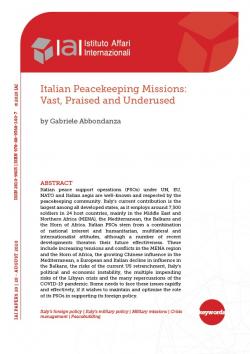Italian Peacekeeping Missions: Vast, Praised and Underused
Italian peace support operations (PSOs) under UN, EU, NATO and Italian aegis are well-known and respected by the peacekeeping community. Italy’s current contribution is the largest among all developed states, as it employs around 7,500 soldiers in 24 host countries, mainly in the Middle East and Northern Africa (MENA), the Mediterranean, the Balkans and the Horn of Africa. Italian PSOs stem from a combination of national interest and humanitarian, multilateral and internationalist attitudes, although a number of recent developments threaten their future effectiveness. These include increasing tensions and conflicts in the MENA region and the Horn of Africa, the growing Chinese influence in the Mediterranean, a European and Italian decline in influence in the Balkans, the risks of the current US retrenchment, Italy’s political and economic instability, the multiple impending risks of the Libyan crisis and the many repercussions of the COVID-19 pandemic. Rome needs to face these issues rapidly and effectively, if it wishes to maintain and optimise the role of its PSOs in supporting its foreign policy.
-
Details
Rome, IAI, August 2020, 16 p. -
In:
-
Issue
20|20 -
ISBN/ISSN/DOI:
978-88-9368-140-7
1. The debate on peacekeeping and the Italian case
2. Italy’s international interests and the potential role of its missions
3. How and why Italian international missions are underused
3.1 The reasons
4. The risks of inaction: a vast potential threatened by new concerns
5. What lies ahead for Italian peace support operations?
References



